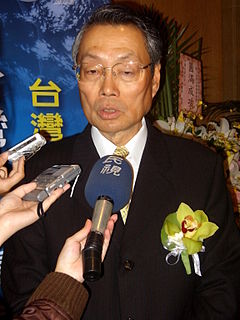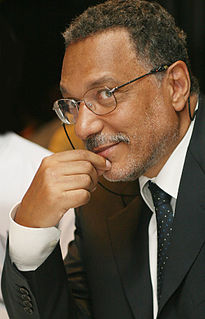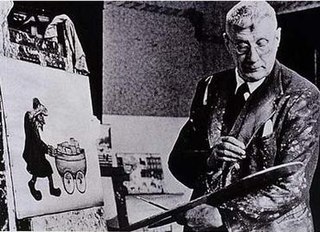Top 1200 Industrial Quotes & Sayings
Explore popular Industrial quotes.
Last updated on November 21, 2024.
Because I had visited Silicon Valley, I recognized the microprocessor was going to lead the second industrial revolution. We Chinese could not miss that opportunity again - we missed the first industrial revolution already. We put our effort into trying to bring this new technology from the United States to Taiwan. That was the begining of Acer.
Industrial jobs are disappearing, and they will continue to disappear owing to productivity gains from automation. Thus, social models that were created to fit industrial and early service economies will no longer be viable. As the industrial workforce shrinks, the social model founded on it will go, too.
There is no need for an end to fish, or to fishing for that matter. But there is an urgent need for governments to free themselves from the fishing-industrial complex and its Ponzi scheme, to stop subsidizing the fishing-industrial complex and awarding it fishing rights, when it should in fact pay for the privilege to fish.
Strong, responsible unions are essential to industrial fair play. Without them the labor bargain is wholly one-sided. The parties to the labor contract must be nearly equal in strength if justice is to be worked out, and this means that the workers must be organized and that their organizations must be recognized by employers as a condition precedent to industrial peace.
Unless we realize that the essence of Nazism is also an attempt to solve a universal problem of Western civilization - that of the industrial society - and that the basic principles on which the Nazis base this attempt are also in no way confined to Germany, we do not know what we fight for or what we fight against... The war is being fought for the structure of industrial society - its basic principles, its purposes, and its institutions.
During the 1960s, and again in the 1970s, growth in manufacturing productivity in the United Kingdom was the lowest of all the seven major industrial countries in the world. During the 1980s, our annual rate of growth of output per head in manufacturing has been the highest of all the seven major industrial countries.
Welfarism and excessive spending and deficits and socialism divide us, because everybody has to go to Washington. Those who have the biggest clout, whose who are the best lobbyists, those who go and they grab. And whether it's the medical industrial complex, or the banking industry, or the military industrial complex, that's who ends up controlling our government...
Obviously Muslim societies, like societies elsewhere, are becoming increasingly urban, many are becoming industrial, but since so many have oil and gas, they don't have a great impetus. But again, the revenue that natural resources produce gives them the capability and so countries like Iran are beginning to develop an industrial component.
When the Industrial Revolution started, the amount of carbon sitting underneath Britain in the form of coal was as big as the amount of carbon sitting under Saudi Arabia in the form of oil, and this carbon powered the Industrial Revolution, it put the 'Great' in Great Britain, and led to Britain's temporary world domination.
The industrial revolution fueled all of humanity, everything we do has been exploding ever since. It's been the biggest most impacting thing, not only for human beings in the last 250 million years, but also the planet, which caused the ice age, which buried the forest. It's this circle because of the industrial revolution, it's neither good or bad, it enabled all of modernization, extended our life, it changed everything. It's the most impactful thing that happened to the planet and the people.
However, if we leave the industrial machinery and their energy-distribution networks and leave them also all the people who have routine jobs operating the industrial machinery and distributing its products, and we take away from all the industrial countries all their ideologies and all the politicians and political machine workers, people would keep right on eating. Possibly getting on a little better than before.
The prison industrial complex, to put it in its crassest term, is a system of industrial mass incarceration. So there's what you call bureaucratic thrust behind it. It's hard to shut off because politicians rely upon the steady flow of jobs to their district that the prison system and its related industries promise.
At the beginning of the 20th century, there were less than 3 billion people on the earth, closer to 2 billion. By all measures that we can come up with right now,. with the lifestyle and consumption pattern of the Western industrial civilization, we can probably sustain about 2 billion people on this earth. We already have over 6 billion. China and India are aspiring to come on as industrial nations, aspiring to the lifestyle of the Western world, and it simply can't happen.
What was the good of industrial development, what was the good of all the technological innovations, toil, and population movements if, after half a century of industrial growth, the condition of the masses was still just as miserable as before, and all lawmakers could do was prohibit factory labor by children under the age of eight?
China is a great manufacturing center, but it's actually mostly an assembly plant. So it assembles parts and components, high technology that comes from the surrounding industrial - more advanced industrial centers - Japan, Taiwan, South Korea, Singapore, the United States, Europe - and it basically assembles them.
Totalitarianism extends to whatever touches it...psychological technique, as it operates in the army or in a great industrial plant, entails a direct action on the family. It involves a psychological adaptation of family life to military or industrial methods, supervision of family life, and training family life for military or industrial service. Technique can leave nothing untouched in a civilization. Everything is its concern. Technique, which is destroying all other civilizations, is more than a simple mechanism: it's a whole civilization in itself.
The history of lead is a history of neglect. It's a history of decisions on our part not to address the broad implications of what we did to ourselves during the industrial revolution and in the first part of the century when our cities expanded broadly, when we built our housing and we began to depend upon lead as a mainstay of our new industrial culture. We put this stuff in even though we knew it was dangerous, we knew it was going to hurt kids.
Throughout the industrial era, economists considered manufactured capital - money, factories, etc. - the principal factor in industrial production, and perceived natural capital as a marginal contributor. The exclusion of natural capital from balance sheets was an understandable omission. There was so much of it, it didn't seem worth counting.
I ended up going to do a matches program at the state for industrial design. And from there, I got hired at IDEO to joint their design team there - and basically, you are starting as an industrial designer to design products - and then kept asking the question, 'What else can design accomplish? What else can design do?'
Parents' work has shifted markedly around the world - and that goes for every region. Men in particular have been moving away from farmed-based work, and into industrial and post-industrial work - so they've moved away from the home. Women, likewise, have moved into the paid labor force and away from the home.
Here is an educational bombshell: Take from all of today's industrial nations all their industrial machinery and all their energy-distributing networks, and leave them all their ideologies, all their political leaders, and all their political organizations, and I can tell you that within six months, two billion people will die of starvation, having gone through great pain and deprivation along the way.
Neither capitalism nor socialism is capable of meeting our unprecedented global challenges. Both came out of early industrial times, and we are now well into the post-industrial age. Both came out of times when the West still oriented much more to the domination side of the social scale, so both these theories did not pay attention to caring for people and nature.
The information revolution has changed people's perception of wealth. We originally said that land was wealth. Then we thought it was industrial production. Now we realize it's intellectual capital. The market is showing us that intellectual capital is far more important that money. This is a major change in the way the world works. the same thing that happened to the farmers during the Industrial Revolution is now happening to people in industry as we move into the information age.
The products we design are going to be ridden in, sat upon, looked at, talked into, activated, operated, or in some way used by people individually or en masse. If the point of contact between the product and the people becomes a point of friction, then the industrial designer has failed. If, on the other hand, people are made safer, more comfortable, more eager to purchase, more efficient-or just plain happier-the industrial designer has succeeded.
There must be no division by class hatred, whether this hatred be that of creed against creed, nationality against nationality, section against section, or men of one social or industrial condition against men of another social and industrial condition. We must ever judge each individual on his own conduct and merits, and not on his membership in any class, whether that class be based on theological, social, or industrial considerations.
Industrial Society is not merely one containing 'industry,' large-scale productive units capable of supplying man's material needs in a way which can eliminate poverty: it is also a society in which knowledge plays a part wholly different from that which it played in earlier social forms, and which indeed possesses a quite different type of knowledge. Modern science is inconceivable outside an industrial society: but modern industrial society is equally inconceivable without modern science. Roughly, science is the mode of cognition of industrial society, and industry is the ecology of science.
In diminishing the role of the worker's body in the labor process, industrial technology has also tended to diminish the importance of the worker. In creating jobs that require less human effort, industrial technology has also been used to create jobs that require less human talent. In creating jobs that demand less of the body, industrial production has also tended to create jobs that give less to the body, in terms of opportunities to accrue knowledge on the production process.
The gradual depletion of the ozone layer and the related "greenhouse effect" has now reached crisis proportions as a consequence of industrial growth, massive urban concentrations and vastly increased energy needs. Industrial waste, the burning of fossil fuels, unrestricted deforestation, the use of certain types of herbicides, coolants and propellants: all of these are known to harm the atmosphere and environment.
If you talk about the prison-industrial complex, I've fought against the prison-industrial complex when I called for a repeal of the Rockefeller drug laws. The biggest impediment to get the laws changed was the lobbyists. Whether you're talking about healthcare, jobs going overseas, or tax reform, you're always coming up against lobbyists.
Over the past 20 years, I have noticed that the most flexible, dynamic, inquisitive minds among my students have been industrial design majors. Industrial designers are bracingly free of ideology and cant. The industrial designer is trained to be a clear-eyed observer of the commercial world - which, like it or not, is modern reality.
Problems in human engineering will receive during the coming years the same genius and attention which the nineteenth century gave to the more material forms of engineering.
We have laid good foundations for industrial prosperity, now we want to assure the happiness and growth of the workers through vocational education, vocational guidance, and wisely managed employment departments. A great field for industrial experimentation and statemanship is opening up.
Without U.S. independence, North America would have remained a rural, non-industrial breadbasket. Blessed as it was with natural resources, agrarian North America would have supplied cotton and beef and lumber to industrial Britain. America would thus be more like Australia - a nice enough place to live, but no kind of world power.
























































